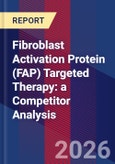Fibroblast activation protein (FAP) is selectively expressed in reactive stromal fibroblasts of epithelial cancers, granulation tissue of healing wounds, and malignant cells of bone and soft tissue sarcomas. This protein is thought to be involved in the control of fibroblast growth or epithelial-mesenchymal interactions during development, tissue repair, and epithelial carcinogenesis.
FAP is expressed on cancer associated fibroblasts (CAFs), a particular cell type found in the tumour microenvironment. CAFs are found in a broad range of cancers (e.g. breast, colorectal, pancreatic, lung, brain and ovarian cancers), but only minimally in normal tissue, making FAP a promising pan-cancer target for both imaging and treatment of cancers. CAFs form part of the environment surrounding the cancer cells, and they can promote cancer growth and the spread of the tumor throughout the body. Targeting the tumor stroma is an alternative way to treat cancer whereby the architecture of the tumor mass is targeted rather than the tumur cells directly.
Targeting of FAP is well suited for tumor stroma delivery of effector moieties such as radioactive or cytotoxic payloads, stimulatory agonists, redirected cytotoxic T-cells, and cytokines/chemokines.








